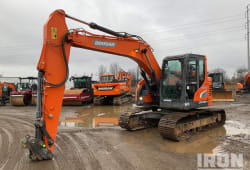Initiating a Referral Program for New Construction Leads
14 Min read
)
August 10, 2023
In the highly competitive construction industry, finding new leads and clients is crucial for business growth. One effective strategy to generate new construction leads is by implementing a referral program. This article will guide you through the steps of creating and promoting a successful referral program specifically tailored for the construction industry.
Understanding the Importance of a Referral Program
A referral program is a systematic approach to encourage your existing customers, business partners, or employees to refer potential clients to your construction business. When executed effectively, a referral program can significantly increase your customer base and bring in high-quality leads.
Referral programs have become increasingly popular in the business world due to their proven effectiveness in generating new business opportunities. By incentivizing individuals to refer others to your construction business, you tap into a powerful marketing strategy that is based on trust and personal relationships.
When customers are satisfied with the services your construction business provides, they become natural advocates for your brand. By implementing a referral program, you are essentially harnessing the power of word-of-mouth marketing and leveraging the positive experiences of your existing clients to attract new ones.
The Role of Referral Programs in Construction Business
In the construction industry, where trust and reputation play a vital role, referral programs can be a game-changer. People tend to trust recommendations from someone they know, and by leveraging existing relationships, you can gain access to a wider network of potential clients.
Imagine a scenario where a satisfied homeowner refers your construction business to their family, friends, and colleagues. These referrals become warm leads, as they already have a level of trust in your services based on the positive experience shared by their acquaintance. This trust significantly increases the likelihood of them becoming paying clients.
Furthermore, in the construction industry, where projects often require a significant financial investment, potential clients are more likely to rely on recommendations from trusted sources. By implementing a referral program, you are positioning your construction business as a reliable and reputable choice, increasing your chances of securing new projects.
Benefits of Implementing a Referral Program
Implementing a referral program can yield numerous benefits for your construction business. Firstly, it helps you leverage the power of word-of-mouth marketing, which is one of the most effective and cost-efficient forms of advertising. By encouraging your satisfied clients to spread the word about your services, you are essentially tapping into a network of potential clients that you may not have reached through traditional marketing efforts.
Secondly, referral programs can lead to higher-quality leads as the referred prospects are more likely to convert into paying clients. When someone is referred to your construction business, they come in with a level of trust and confidence in your services. This trust significantly reduces the sales cycle and increases the chances of them choosing your business over your competitors.
Lastly, a well-executed referral program can boost customer loyalty and satisfaction, as both the referrer and the new client feel a sense of appreciation and reward. By implementing a referral program, you are not only incentivizing your existing clients to refer others but also showing your gratitude by providing rewards or benefits for successful referrals. This creates a positive feedback loop where satisfied clients are motivated to continue referring others, leading to a steady stream of new business opportunities.
In conclusion, a referral program is a powerful tool that can significantly impact the growth and success of your construction business. By leveraging the trust and relationships of your existing clients, you can tap into a wider network of potential clients, increase the quality of leads, and foster customer loyalty. Implementing a well-executed referral program is a strategic investment that can yield long-term benefits for your construction business.
Steps to Implement a Successful Referral Program
Implementing a referral program requires careful planning and execution. Below are the essential steps to set up a successful referral program for your construction business:
Identifying Your Target Audience
Before launching your referral program, it's crucial to identify your target audience. Consider the demographics of your existing clients and determine the most valuable and influential individuals or organizations within their network. This will help you focus your efforts on generating referrals from the right sources.
For example, if your construction business specializes in luxury home renovations, your target audience may consist of affluent homeowners who value high-quality craftsmanship and attention to detail. By understanding your target audience, you can tailor your referral program to appeal to their specific needs and preferences.
Furthermore, conducting market research and analyzing customer data can provide valuable insights into the preferences and behaviors of your target audience. This information can guide your decision-making process when designing your referral program, ensuring that it aligns with the interests of your potential referrers and new clients.
Setting Up the Referral Program Structure
Next, determine the structure of your referral program. Will you reward referrers with cash incentives, discounts on future services, or other rewards? Define the terms and conditions for eligibility and communicate them to your existing clients and potential referrers. Remember to make the reward enticing enough to motivate participation, but also manageable for your construction business.
When setting up the structure of your referral program, it's important to consider the overall goals you want to achieve. Are you looking to increase brand awareness, generate new leads, or boost customer loyalty? The structure of your referral program should align with these objectives and encourage the desired actions from your referrers.
Additionally, think about the timing and frequency of your referral program. Will it be an ongoing initiative or a limited-time promotion? By carefully planning the duration of your program, you can create a sense of urgency and encourage referrers to take action promptly.
Choosing the Right Incentives for Referrals
When selecting incentives, consider what would truly resonate with your referrers. In the construction industry, incentives such as free upgrades, exclusive access to new services, or priority scheduling can be appealing. Additionally, consider offering incentives to both the referrer and the new client, to ensure everyone feels valued and motivated to participate.
For instance, offering a referrer a discount on their next construction project can provide them with a tangible benefit for their referral. At the same time, extending a special offer or bonus to the new client can incentivize them to choose your construction business over competitors.
Furthermore, consider implementing a tiered reward system that offers increasing incentives for multiple referrals. This can encourage referrers to continue promoting your business and help you build a network of loyal advocates.
Remember, the key is to choose incentives that align with your target audience's desires and preferences. By understanding what motivates your referrers, you can create a referral program that not only attracts new clients but also strengthens the relationship with your existing ones.
Promoting Your Referral Program
Now that you have your referral program in place, it's time to promote it to maximize its potential. Effective promotion can significantly boost participation and generate a higher number of referrals.
But how can you ensure that your referral program gets the attention it deserves? Let's explore some strategies that can help you promote your program and attract a wider audience.
Utilizing Social Media for Promotion
Social media platforms provide an excellent opportunity to reach a wide audience and encourage participation in your referral program. With billions of active users, platforms like Facebook, Instagram, and LinkedIn can be powerful tools in your promotional arsenal.
When promoting your referral program on social media, it's important to create engaging visuals that catch the eye. Use high-quality images and videos that showcase the benefits of participating in the program. Consider creating infographics or short explainer videos that explain how the program works and highlight the rewards participants can earn.
In addition to visuals, testimonials can also be a powerful tool in promoting your referral program. Encourage your existing clients to share their positive experiences and refer their connections through these channels. This social proof can help build trust and encourage others to participate in the program.
Don't forget to include clear call-to-actions in your social media posts. Make it easy for your audience to understand how they can participate and provide them with the necessary links or instructions to get started. You can also consider running social media contests or giveaways to incentivize participation and generate excitement around your referral program.
Email Marketing Strategies for Referral Programs
Utilize your email marketing channels to communicate your referral program to your existing clients and contacts. Email marketing can be a highly effective way to reach your target audience directly and encourage them to take action.
When crafting email campaigns for your referral program, it's essential to create compelling content that highlights the benefits of participating. Clearly explain how the program works and what participants stand to gain. Consider using storytelling techniques to make your emails more engaging and relatable.
Personalization is key when it comes to email marketing. Include personalized referral links for easy tracking and make sure to address your recipients by their names. This personal touch can make your emails feel more tailored and increase the chances of conversion.
To further incentivize participation, you can offer exclusive promotions or added incentives for those who refer multiple leads. For example, you can provide discounts, freebies, or even special access to premium features for successful referrals. These exclusive rewards can motivate your existing clients to actively promote your program to their networks.
Remember to regularly follow up with your email subscribers to remind them about your referral program and encourage continued participation. You can send periodic updates on the progress of the program, share the success stories of participants, and provide additional resources or tips to help them make the most out of their referrals.
By utilizing social media and email marketing strategies, you can effectively promote your referral program and attract a wider audience. Remember to continuously track and analyze the results of your promotional efforts to identify what works best for your business. With the right promotion, your referral program has the potential to become a powerful tool for growth and success.
Monitoring and Improving Your Referral Program
Once your referral program is up and running, it's essential to continuously monitor its performance and make necessary adjustments to improve its effectiveness.
Implementing a referral program is just the first step toward growing your customer base and increasing sales. To ensure the success of your program, you need to actively track and measure its performance.
Tracking the Success of Your Referral Program
Implement a system to track and measure the success of your referral program. Monitor the number of referrals generated, the conversion rate of those referrals, and the lifetime value of the referred clients. By tracking these key metrics, you can gain valuable insights into the effectiveness of your program.
For example, if you notice a high number of referrals but a low conversion rate, it may indicate that your program needs to be more targeted or that your incentives are not appealing enough to potential customers. On the other hand, if you have a low number of referrals but a high conversion rate, it may suggest that your program is not reaching enough people.
Regularly analyzing the data will help you identify patterns or areas for improvement. Look for trends in referral sources, such as which marketing channels or customer segments are generating the most referrals. This information can help you focus your efforts on the most effective strategies.
Making Necessary Adjustments for Improvement
Based on your analysis, make adjustments to your referral program accordingly. This may involve modifying the incentives, refining your promotional strategies, or making changes to the eligibility criteria.
For instance, if you find that your referral program is not generating enough referrals, you might consider increasing the incentives for referrers. Offering a higher reward or bonus can motivate your customers to actively promote your products or services to their network.
Additionally, it's crucial to be open to feedback from referrers and new clients. They can provide valuable insights into how your referral program can be improved. Encourage them to share their experiences and suggestions, and use this feedback to guide your decision-making process.
Remember that a referral program is not a one-size-fits-all solution. It requires constant monitoring and adjustments to ensure its effectiveness. By regularly tracking its success and making necessary improvements, you can maximize the potential of your referral program and drive significant growth for your business.
Case Studies of Successful Referral Programs in Construction
Examining case studies of successful referral programs in the construction industry can provide valuable insights and inspiration for your program. Let's take a closer look at two case studies that showcase innovative approaches to referral programs.
Case Study 1: XYZ Construction Company
XYZ Construction Company, a leading player in the construction industry, implemented a referral program that offered referrers a monetary reward equivalent to 5% of the total contract value of the referred project. In addition to the monetary incentive, they also provided an exclusive 10% discount to the referred client. This comprehensive approach aimed to incentivize both the referrer and the referred client, creating a win-win situation for all parties involved.
The results of XYZ Construction Company's referral program were remarkable. The implementation of this program led to a significant 30% increase in new projects. By leveraging the power of word-of-mouth marketing, the company successfully expanded its client base and increased its revenue streams. Moreover, the referral program also contributed to a 15% increase in customer satisfaction, as clients felt valued and appreciated for their referrals.
Case Study 2: ABC Builders
ABC Builders, a renowned construction firm known for its commitment to customer satisfaction, created a unique referral program that went beyond monetary rewards. Understanding the importance of personalized service, ABC Builders offered referrers exclusive access to a dedicated customer service representative throughout their project.
This personalized approach not only enhanced the overall customer experience but also fostered a sense of loyalty and trust. Referrers felt supported and valued throughout the construction process, which encouraged them to continue referring ABC Builders to their network. As a result, ABC Builders experienced a substantial 20% increase in referral-generated business, solidifying their reputation as a trusted and customer-centric construction company.
By examining these case studies, it becomes evident that successful referral programs in the construction industry require a combination of attractive incentives, personalized service, and a strong focus on customer satisfaction. These programs not only help expand the client base but also foster loyalty and trust among existing clients. Consider implementing similar strategies in your referral program to unlock its full potential and achieve sustainable growth in your construction business.
Overcoming Challenges in Implementing Referral Programs
While referral programs can be highly effective, they can also present challenges. By being aware of common obstacles and knowing how to overcome them, you can ensure the success of your program.
Common Obstacles and How to Overcome Them
One common challenge in implementing a referral program is getting your existing clients to actively participate. To overcome this, provide clear instructions and make the process as effortless as possible. Consider offering reminders and follow-ups to increase engagement and motivation.
Lessons Learned from Failed Referral Programs
Learning from failed referral programs is equally important. Analyze what went wrong in unsuccessful attempts and identify the underlying causes. Whether it was inadequate rewards, poor communication, or a lack of follow-up, use these insights to avoid repeating the same mistakes in your implementation.
Implementing a referral program for new construction leads can be a game-changer for your business. By understanding the importance of such programs, following the necessary steps, effectively promoting the program, and monitoring its success, you can leverage the power of referrals to grow your construction business. Learn from successful case studies and overcome challenges to maximize the effectiveness of your referral program. Remember, building strong relationships and fostering trust with your existing clients and partners is key to generating a consistent stream of high-quality construction leads.

Post acquisition of Boom & Bucket, the company he founded, Adam now leads Marketplace Growth for Ritchie Bros.














